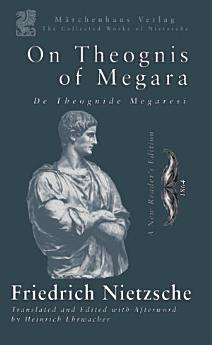On Theognis of Megara: A New Reader's Edition
May 2024 · The Collected Works of Friedrich Nietzsche Book 5 · Marchen Press
Ebook
158
Pages
family_home
Eligible
info
reportRatings and reviews aren’t verified Learn More
About this ebook
This was Nietzsche's valediction thesis, published in 1864, when he was only 19 years old. The original Latin title was "De Theognide Megaresi". Written in Latin with extensive Greek quotations, Nietzsche chose the Greek poet Theognis as the subject of his final thesis at the School of Pforta. He focused on Theognis' life in Megara, his poetry, and his views on the gods, morality, and politics. Nietzsche saw Theognis as a defender of the defeated Megarian aristocracy, dedicated to preserving the noble virtues of the Dorian spirit. Beyond scientific philology, Nietzsche's interests extended to the social and political themes he found in Theognis' work. This was Nietzsche's last paper as part of his graduation from Schulpforta, a prestigious boarding school in Germany, before going to the University of Bonn, where he learned Greek, Latin, French, and Hebrew. Here he begun to show an interest in philology, music, and the poetry of Hölderlin (who was also a favorite of Heidegger's). After a year at the University of Bonn, Nietzsche transferred to the University of Leipzig in 1865. This work was subsequently published posthumously in the volume "Gesammelte Werke" edited by Peter Gast (a pseudonym for Heinrich Köselitz, a close associate of Nietzsche) and Elisabeth Förster-Nietzsche (Nietzsche's sister). They were included in the second series of these collected works under the title "Philologica," which was published in 1897 and several editions after that. This modern translation from the original manuscript is designed to allow the armchair philosopher to engage deeply with Nietzsche's works. The language is modern and clean, with simplified sentence structures and diction to make Nietzsche's complex language and arguments as accessible as possible. This Reader's Edition also contains extra material that amplifies the manuscript with autobiographical, historical and linguistic context. The edition includes an Afterword by the Translator on the history, impact and intellectual legacy of Nietzsche in context of this work, an index of Philosophical concepts used by Nietzsche with a focus on Existentialism and Phenomenology, a complete chronological list of Nietzsche's entire body of works, and a detailed timeline of Nietzsche's life journey, including the personal relationships which greatly influenced his philosophy.
About the author
Friedrich Nietzsche (1844-1900) was a watershed German philosopher, cultural critic, poet, musician (briefly) and philologist (the study of ancient manuscripts) whose work has had a profound impact on modern intellectual history. Known for his critiques of European morality and religion (particularly Protestantism), Nietzsche's ideas on the "will to power" and the "Übermensch" have influenced a wide range of philosophical, literary, and psychological thought including thinkers such as Martin Heidegger, Albert Camus, Michael Foucault and the entire Postmodern religion.
Rate this ebook
Tell us what you think.
Reading information
Smartphones and tablets
Install the Google Play Books app for Android and iPad/iPhone. It syncs automatically with your account and allows you to read online or offline wherever you are.
Laptops and computers
You can listen to audiobooks purchased on Google Play using your computer's web browser.
eReaders and other devices
To read on e-ink devices like Kobo eReaders, you'll need to download a file and transfer it to your device. Follow the detailed Help Center instructions to transfer the files to supported eReaders.











